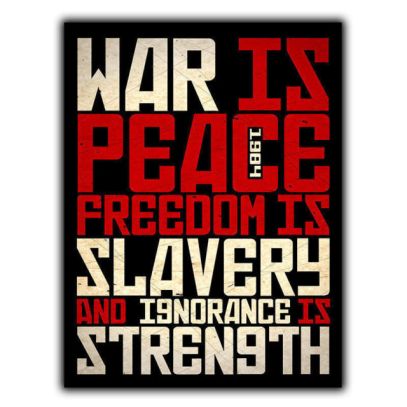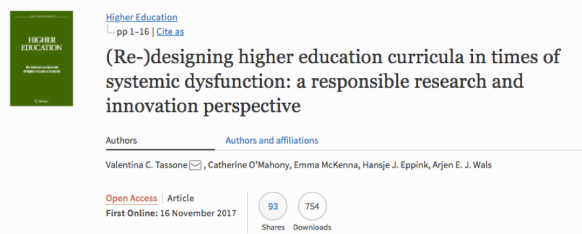
In times of systemic global dysfunction, post-truth, alternative facts, cultivated doubt and the erosion of meaning, I found it useful to turn back, once again, to George Orwell’s infamous “1984”. Well over 10 years ago, in 2004, I co-authored a paper on the danger of ‘doublespeak’ and ‘Newspeak’ in relation to the integration of sustainability in higher education. Back then this was an emerging trend, nowadays, it sometimes signifies a transition in education but more often little more than rethoric and green gloss. For me this is a good reason to re-introduce this paper here with Orwell’s cautionary tale but also with some ideas about how to move forward responsibly. Below an excerpt from the paper which you can find here in its totality: Jickling and Wals Orwell’s Cautionary Tale
Wals, A.E.J. & Jickling, B. (2002). “Sustainability” in Higher Education from doublethink and newspeak to critical thinking and meaningful learning. Higher Education Policy, vol. 15, 121-131. SustinHEOrwellsCautionaryTale
“Sustainability talk can, when used by advocates with radically different ideas about what should be sustained, mask central issues under the false pretense of a shared understanding, set of values and common vision of the future.
However, critical thought depends on transcendent elements in ordinary language, the words and ideas that reveal assumptions and worldviews, and the tools to mediate
differences between contesting value systems. And worse still, sustainability talk can
lead us in the direction of Orwell’s (1989) famously satirical notion of “doublethink”
whereby ordinary citizens can increasingly hold in their minds contradictory meanings
for the same term and accept them both (Orwell, 1989, p. 223).
The power of universal discourse in reducing meaning to a minimum is such that, as in “1984”, antagonistic concepts can be conjoined in a single phrase (“war is peace”, “peace is war”) or concept (i.e. “sustainable growth”) (Jickling, 2001). Big Brother’s “Newspeak” was designated not to extend but to diminish the range of thought, and this purpose was
indirectly assisted by cutting down the choice of words to a minimum (Orwell, 1989,
p. 313).
In Newspeak concepts capable of opposing, contradicting or transcending
the status quo were liquidated. As a result of this devaluation of language the people
in “1984” found themselves in a state of linguistic dysfunction which was exactly
what Big Brother wanted (Jickling, 2001).
Seen this way sustainability tends to blur the very distinctions required to evaluate an issue thoughtfully. When comparing the sustaining of ecological processes with the sustaining of consumerism we immediately see inconsistencies and incompatibilities of values, yet many people, conditioned to think that sustainability is inherently good, will promote both at the same time.”


